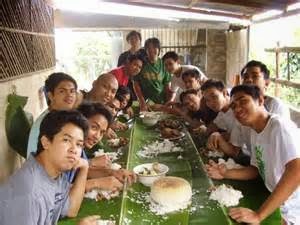Transcending Filipinism

The term Filipinism by itself is
Filipinism. It is uncommon in usage internationally, but somehow it made its
way to world dictionaries and may refer to usage resulting from literally
translating Tagalog words into English. These are English usage peculiar to and
used only by Filipinos. Turn on/ off the lights is spoken as Open/ Close the
lights; CR or Comfort Rooms are used instead of Toilets (The word “Toilet” has
sensibility issue and considered unhygienic); Napkins are referred to as
Tissue; Canteen is used instead of Cafeteria; Colgate means Toothpaste even
though it’s a Close-Up; Refrigerator is generally called Frigidaire: Xerox is
to photocopy even if the machines in use are UBIX, Brothers, etc. The preceding
examples demonstrate that Filipinism is beyond lingual.
It is about tradition,
customary practice and generally accepted norms that manifest in language and its usage. Filipinism is also
expressions in actions like; the” boodle fight” to celebrate brotherhood and oneness; pouting or swaging of the lips
to point direction; the rectangular fingers sign demanding for receipt; the
smile with a nod when crossing path with a neighbor or acquaintance as a sign of courtesy; the
surrender of a forehead to the hands of an elder upon reaching home to symbolize respect and subjugation.
 | |
| Boodle Fight with a Tourist |
 | |
| Mid Boodle Fight |
 | |
| Food before the Boodle Fight |
Filipinism
is about expediency and conservation of personal energy amid the life of scarcity and
rare abundance. Filipinism is about the Filipino families whose
members might be highly educated and thus by themselves understand the rules of
English grammar but nonetheless accept these usages as a Filipino way of
expression. The literal meaning in Filipino of English words and phrases is
nearer to their heart because it is unpretentious and more understandable. It
signifies empathy to the less educated. It is a way of reaching out. It is a
means of patronage for the family members and relatives who were denied the
opportunity to step a foot inside the halls of education, a mode of social blending. Filipinism is truly
about the Filipino family, their uncompromising love, and concern for each
other. The willingness to sacrifice personal comfort and happiness in order to
bring a taste of the good life to their family.
It is about their bond, and generally
in all modesty a bond that maybe regarded as perpetual and unbreakable. Filipinism
is more than language, again it is about the Filipino sensibilities, it is
about a culture.
Let us now give a thought on the
positivities of Filipinism and the possibility of transcending it to
National-ism. It may safely be deduce
that Filipinism is borne by scarcity and rare abundance; the need to complement
each other; by patronage; respect; responsibility; tolerance; conservation, prudence and
expediency. These elements were brought about by a common bond, that is, the
sense of belonging and sharing. If the latter can be harness on a national level, to make each social unit of a family feel and actually be made as part of a
whole through transparency, consultation and true participation in dealing with national issues particularly its effect on the ordinary Filipino's way of life, then maybe Filipino Nationalism can become the collective meaning of
Filipinism, unbreakable..., perpetual.



Comments
Post a Comment